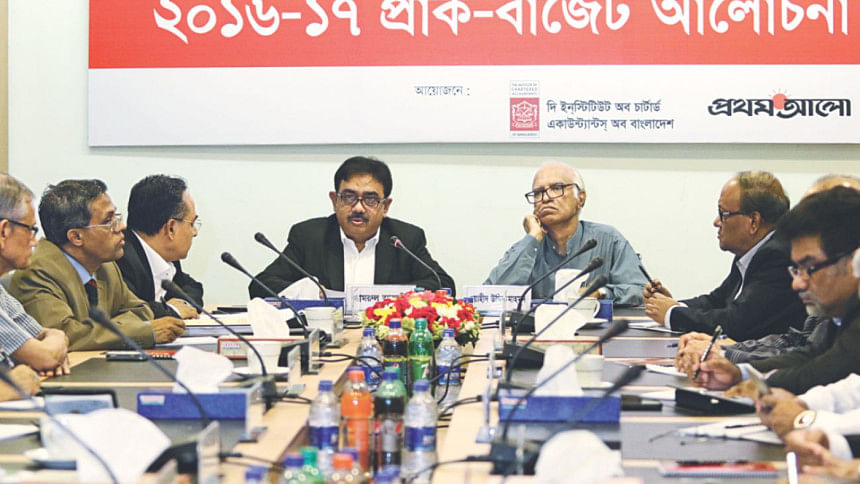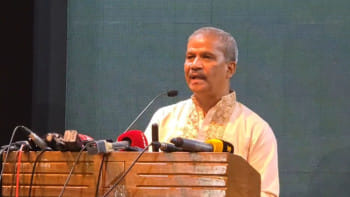Analysts oppose universal 15pc VAT

The government should not apply a universal 15 percent VAT on all items, considering the prevailing situation in Bangladesh, as it will hurt the small and medium enterprises, analysts said yesterday.
Imposing a universal value-added tax rate at this time will be quite dangerous, said Prof Wahiduddin Mahmud, a leading economist.
Instead of imposing 15 percent VAT for all, the indirect tax should be applied fully for those businessmen who maintain records and accounts and can claim rebate on previously paid VAT on input.
Those who do not have adequate papers should be allowed to pay VAT based on value addition in that stage, he suggested.
It will rather be good to have two systems in place, said Mahmud at a discussion on the national budget for fiscal 2016-17. The Institute of Chartered Accountants of Bangladesh and Prothom Alo jointly organised the event at the newspaper's office in Dhaka.
However, Mahmud, a former adviser to the caretaker government, said the benefit should be given in a way that those businessmen who do not maintain records and accounts feel encouraged to do that in future.
There should be a disincentive for not maintaining records and accounts; but they should be given scope, he added.
His recommendations came after participants in the discussion said small and medium enterprises will face difficulties if 15 percent VAT is applied from the next fiscal year under a new law.
It is told that businesses will get input tax credit or rebate under the new law that envisages 15 percent, said Mahmud. But relatively small businesses do not have that level of accounting systems based on which they can claim rebate on the VAT paid previously on input, he said.
“This will create a huge discrimination.”
Presently, the extent of discrimination is not very high as a small amount of VAT has been paid at different stages, he added.
Mahmud also suggested two rates of VAT between essential goods and luxury goods, as the impact of VAT will be higher on the poor than the rich.
He advised the government to take all necessary steps to create a favourable environment to boost private investment.
“Private investment has to increase,” he said, citing that the private investment to GDP ratio has been declining in the last couple of years. He also raised questions on how the government selects and prioritises the large projects, or whether there is any evaluation on the possible economic benefits or environmental impacts of those projects.
Citing the government's bid to establish a coal power plant at Rampal, he said there have been discussions tied to the project, mainly on the environmental impact.
He asked whether there was any economic feasibility study done on the plant.
On the 15 percent VAT, Md Jashim Uddin, former senior vice president of the Federation of Bangladesh Chambers of Commerce and Industry, said businesses placed their proposals to amend the law to help micro- and small businesses flourish.
He warned that prices of various items such as rod and cooking oil would rise if the universal VAT rate is imposed.
Before enforcement of the new law, it should be seen whether all are prepared, said Muhammad Abdul Mazid, former chairman of the National Board of Revenue.
Sultana Kamal, former adviser to the caretaker government, said the budget allocation is one-sided in many areas. She asked why so much is spent on defence, while allocations for health and education are poor in percentage of the GDP. She also demanded a stop to the misuse of public funds and curb corruption.
“Taxpayers feel discouraged when they see national wealth and money being wasted. The government needs to be more careful in this regard and ensure accountability in all areas,” said ICAB President Kamrul Abedin.
He also suggested the government restrict employment of foreign nationals in sensitive positions, to prevent leakage of undisclosed country information.
AF Nesaruddin, a member of ICAB council, said there should be a check and balance on the discretionary power of taxmen. It is also necessary to curb corruption, he added.
Asif Ibrahim, former president of Dhaka Chamber of Commerce and Industry, questioned the rationale behind imposing VAT on the issue and renewal of licences, such as trade licences.

 For all latest news, follow The Daily Star's Google News channel.
For all latest news, follow The Daily Star's Google News channel. 



Comments